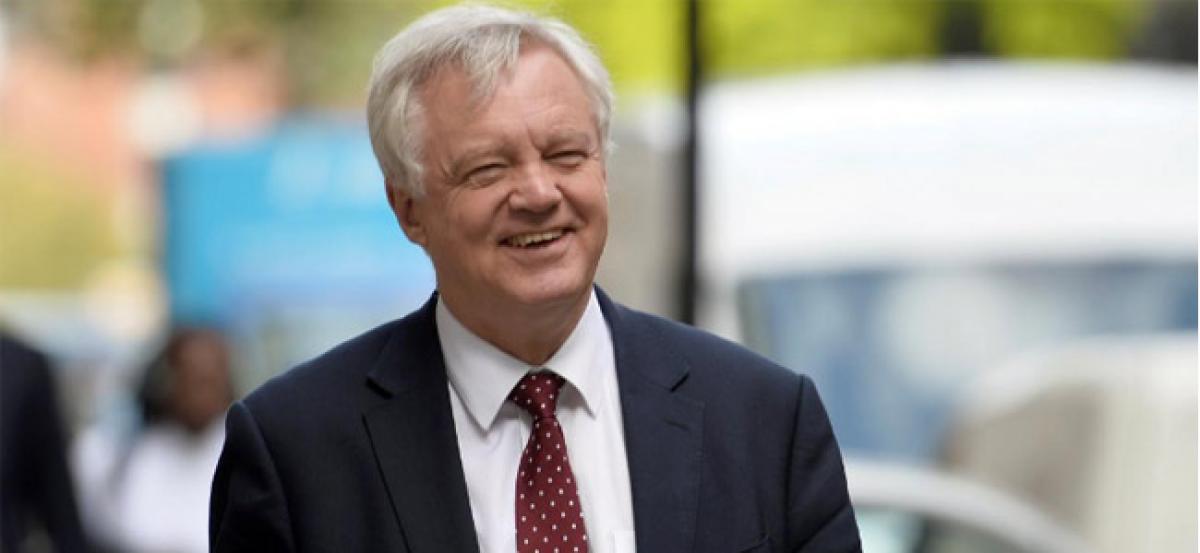Live
- G20 Leaders Will Talk About Climate, Taxes, and Trump's Return in Brazil
- COP29: CDRI announces $8 million funding for 12 projects to address climate crisis
- Anti-Telgu remarks: Actor Kasthuri Shankar moves court for bail
- Samsung AR Smart Glasses Set to Launch in 2025, Featuring Ray-Ban Meta-Like Design
- Kerala Industries Minister confident that new policy will boost plantation sector
- Madras HC plans inter-departmental monitoring committee to combat drug use in TN
- Bihar: Spotted deer dies due to heart attack in Banka district
- Mushtaq Ali T20: Shami to spearhead Bengal bowling attack, Gharami named captain
- Kharge's clarion call to oust Maharashtra's BJP-backed MahaYuti
- Why Ukraine’s Use of US Missiles Against Russia Could Lead to World War 3
Just In

Britain has said it wants an interim customs agreement with the European Union after Brexit to allow the freest possible trade of goods, but that it will also seek the right to negotiate other trade deals -- a possible sticking point in the talks
LONDON: Britain has said it wants an interim customs agreement with the European Union after Brexit to allow the freest possible trade of goods, but that it will also seek the right to negotiate other trade deals -- a possible sticking point in the talks.
According to excerpts of a government document to be published on Tuesday setting out Britain's strategy, the government will say one option to minimise friction when it leaves the bloc in March 2019 would be to introduce a temporary customs union, which should be "time-limited".
That would provide certainty for businesses, the government said, aiming to address a main concern of companies who fear the introduction of customs checks will cause expensive delays.
"Ministers will announce an intention to seek an 'interim' period with the EU of close association with the customs union that would allow for a smooth and orderly transfer to the new regime," the government said in a statement ahead of publication of the first in a series of "future partnership papers".
"One possible approach would be a temporary customs union between the UK and the EU ... During this interim period, which will be negotiated with Brussels, Britain will look to negotiate bold new trade relationships around the world."
Businesses welcomed the proposals, but the Confederation of British Industry also warned the government that "the clock is ticking and what matters now is giving companies the confidence to continue investing as quickly as possible".
EU WANTS PROGRESS ON WITHDRAWAL
The EU said it would study the proposals carefully but it would only address the proposal for an implementation period once sufficient progress had been made on Britain's withdrawal.
The EU wants to make progress on several key issues by October, including the financial bill for Britain's exit, but Brexit minister David Davis told the BBC there would not be an agreed figure on the financial settlement by then.
"We're going to talk it through very, very carefully, so at this stage we're not going to commit," he said.
He later told LBC Radio: "We're going to have a long haggle ... (EU chief negotiator) Michel (Barnier) is getting quite cross with us. He's saying 'You should make your proposal'."
Davis said Britain should not have to pay to have a temporary customs union with the EU. Any transitional period would most likely last for two years, he added, and must be over by the time of the next British national election, due in 2022.
In an effort to move the talks with the EU on to the issue of Britain's future relationship, Prime Minister Theresa May and her government had promised to publish a series of policy documents this week.
But after being accused by some EU officials of being ill prepared for the first rounds of negotiations, the government's demand to secure trade deals while participating in a temporary customs union may cause further problems.
"It looks like the new unified position in the cabinet is to return the government to the territory of wanting to have their cake and eat it", said Chris Leslie, a pro-EU campaigner and member of Britain's opposition Labour Party.
TURKISH ARRANGEMENT?
Countries that are part of the EU's customs union are not allowed to negotiate bilateral trade deals, and May's government has said Brexit means Britain must leave the customs union.
But Turkey, while not an EU member, is part of a separate customs union for industrial goods and can still negotiate bilateral trade deals. It was not clear whether Britain was pursuing a similar arrangement to Turkey.
The government said that, by sorting out the customs arrangements, Britain and the bloc could avoid a "hard border" with EU member state Ireland, something that officials fear could reignite tensions between Irish nationalists and unionists in British-ruled Northern Ireland.
It proposed two different approaches -- a highly streamlined customs arrangement managed by Britain, or a new customs partnership with the EU -- that it said could "negate the need for a customs border".
The government will set out its proposed solutions for the border between Northern Ireland and Ireland in detail on Wednesday.
The position papers are intended to flesh out the government's Brexit vision and show a united stance over the future relationship after rifts emerged among ministers.

© 2024 Hyderabad Media House Limited/The Hans India. All rights reserved. Powered by hocalwire.com







